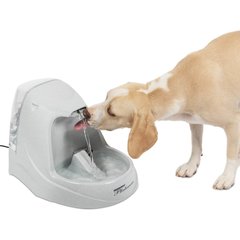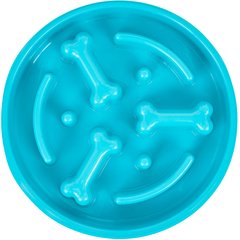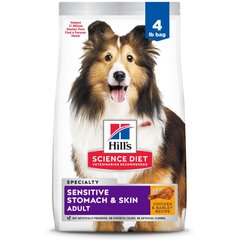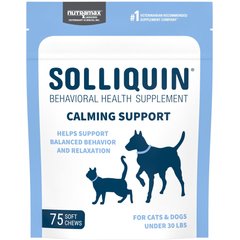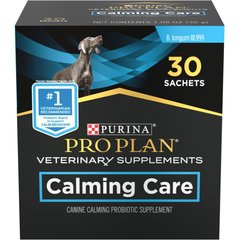Why Is My Dog’s Stomach Gurgling?
Adobe Stock/Przemyslaw Iciak
Why Is My Dog’s Stomach Making Noises?
There are many reasons why your dog’s stomach may be gurgling. Sometimes it’s totally normal and nothing to worry about, but sometimes a dog’s stomach makes noise when there’s a problem.
Digestion
While stomach grumbling and rumbling can be noisy, it’s often a normal part of digestion. Stomach noises, also called borborygmi, are the result of food and water moving through the digestive tract in a process called peristalsis.
The gastrointestinal (GI) tract includes the stomach, small intestines, and large intestines. Each of these organs contain smooth muscle to help move food and water through the body.
Peristalsis occurs when these muscles contract in rhythmic waves to move food through the GI tract—and this movement can result in normal stomach noises. You might hear your dog’s stomach gurgling immediately after they’ve eaten.
Hunger
When the stomach and intestines are empty, there’s nothing to muffle the sound. Imagine water moving through a hollow pipe—that’s why we often hear our dogs' stomachs grumblings more when it’s been a while since they’ve eaten.
Diarrhea
While stomach noises can be very normal, a dog’s stomach may make more noise when it’s upset or experiencing a gastrointestinal disturbance.
Diarrhea may cause an increase in stomach noises as food and water move more rapidly through the digestive tract. Dogs may have a lot of stomach noise right before they experience a bout of diarrhea.
Eating Something New
When a dog sneaks into the garbage or gets a new treat that doesn’t agree with them, they may have difficulty with digestion that leads to more stomach noises. This can happen if your dog gets food poisoning, tries a new dog-safe “people” food for the first time, or switches to a new dog food too quickly.
Bowel Obstruction
A bowel obstruction is a serious condition that can lead to lots of stomach noises.
Sometimes dogs will eat things that are not digestible food items (socks, bones, and corn cobs are common offenders). These objects can get stuck in their stomach or intestines, causing an increase in gas as their body attempts to move the object forward. This can lead to more audible noises.
If your dog ate something they shouldn’t have, contact your veterinarian immediately. An obstruction can be life-threatening.
Gastrointestinal Disorders and Diseases
Underlying gastrointestinal disorders or syndromes, such as inflammatory bowel disease (IBD) or exocrine pancreatic insufficiency (EPI), may lead to increased stomach noises.
Parasites and Bacterial Infections
Parasites and bacterial infections (including coccidia, salmonella, E. coli, or giardia) can all play a role in increased dog stomach noises. They may reduce the absorption of nutrients and/or produce gas on their own as they colonize the GI tract.
Gas
Increased stomach noises can also simply be the result of increased gas.
Gas in dogs can be normal; it occurs when intestinal bacteria process less-digestible food or ingredients in your pet’s diet. While carbohydrates are an important source of energy, they can also be a source of gas. When carbohydrates are broken down, their fiber is fermented, producing gas.
Swallowing air can also be a source of gas. A panting dog may swallow more air, leading to increased gas and increased stomach noises.
The amount of gas a dog has in their GI tract can change from day to day. Some dogs have sensitivities to certain ingredients that, when given as a treat, lead to an increased gas production.
You may notice that your dog has more gas, and consequently more stomach noises, after they’re given a particular treat, like a pup cup, as they have more difficulty digesting the lactose in dairy products.
When Should You Call the Vet for Dog Stomach Gurgling?
While stomach noises in dogs are often normal, gurgling can sometimes indicate a problem with digestion. If your dog’s stomach gurgling is accompanied by any of the following signs, call the vet:
-
Vomiting or retching
-
Severe diarrhea or persistent diarrhea lasting more than 24–48 hours
If you’re hearing an abnormal amount of gurgling, watch your pet closely for any signs of abdominal pain or hunching. Don’t hesitate to call your veterinarian right away if the stomach noises come with other clinical signs.
How To Help Your Dog’s Gurgling Stomach
Remember, stomach noises are usually harmless and mean that your dog's stomach and intestines are doing what they’re supposed to do.
If your dog has a normal energy level, appetite, and stools, but their stomach gurgling seems excessive, here are a few things you can try at home.
Offer Fresh Water
Make sure your dog has access to plenty of fresh water. Water helps move food along the gut and is essential for regular bowel movements. Consider a dog water fountain to help with hydration.
Feed From a Slow Feeder Bowl
When a dog eats too quickly, they swallow more air. This air leads to gas and more stomach noises. Slow-feeder bowls may have plastic knobs or grooves that the kibble falls into, forcing your dog to slow down as they use their tongue to carefully remove each piece of kibble.
Provide Smaller Meals
Try splitting their meals into smaller, more frequent portions. Avoid the temptation to add an afternoon or late-night snack, as that can result in excessive weight gain and extra calories your dog doesn’t need if they’re already being fed the right portions of food.
Instead, split the amount you're already feeding into smaller portions. For example, instead of feeding two cups twice daily, try feeding 1⅓ cups three times a day. This will reduce the amount of time your dog’s stomach is empty, making their stomach less noisy.
It may also help to switch to a diet specially formulated for sensitive stomaches, like Hill's Science Diet Sensitive Stomach & Skin Adult Dry Dog Food. Be sure to talk to your vet first before switching to a new dog food.
Don’t Let Your Dog Overeat
Free-feeding can lead to overeating. While smaller, more frequent meals can reduce your dog’s stomach gurgling, overeating can increase stomach noise and make it more difficult for your dog’s digestive system to do its job.
Use Calming Treats
In some dogs, anxiety leads to increased panting and air swallowing, which leads to more gas and gurgling.
Additionally, high levels of stress can slow the process of their stomach emptying and sending food to the intestines, which increases gastrointestinal noise. Chronic stress can also suppress the immune system and leave the dog vulnerable to infections and unbalanced gut bacteria.
You can help your dog reduce stress by giving them calming supplements, such as Nutramax® Solliquin®. Some supplements, like Purina® Pro Plan® Calming Care, contain probiotics to improve digestion as well as promoting relaxation.

